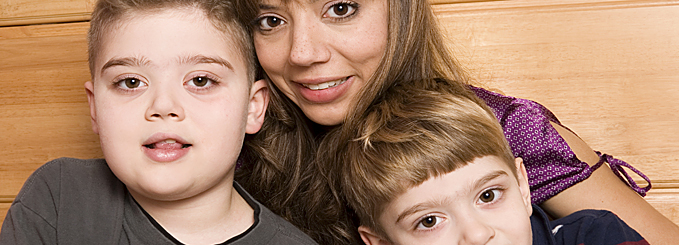
Addressing the 14 challenges
Interventions and support should be customised to the needs of each individual with an autism spectrum disorder and the needs of their family, taking in to account the level of intellectual ability and stage of life.
The Autism Strategy for Stirling and Clackmannanshire proposes a local menu of interventions to address each of these challenges.
The Menu of Intervention sets out 14 main challenges commonly experienced by people with ASD:
Understanding the implications of an autism spectrum diagnosis
- Post diagnostic discussion(s) and individualised counselling. The provision of good quality education and information packs for individuals, families/carers along with appropriate verbal discussion at time of need. Use of visual props if needed. Signposting to useful websites and forums.
Development of effective means of communication
- Individualised language therapy assessment. Updated as required. Alternative and augmentative communication systems introduced where required. Work to ensure language system (regardless of form) is used functionally and is therefore effective on an individual basis. Teaching/learning on internet etiquette and supervision.
Development of social communication
- Targeted social communication programmes delivered either individually or in a group setting as required and appropriate to the individual to include internet etiquette and promotion of online safety.
Developing and maintaining relationships
- Work to assess the understanding of relationships and promotion of skills to develop relationships including sexuality issues and intimate relationships. Access to social groups, friendship circles etc
Social isolation for individual with autism
- Accessible social groups and opportunities, support in the community. Befrienders. Respect the need to be alone at times. Acceptance by families that friendships can take many forms.
Social isolation for family
- Family/ Partner/ Carer support, opportunity for respite. Access to autism friendly environments.
Learning to develop skills
- A functional assessment of the person’s cognitive abilities and learning style leading to a planned programme both directly with the individual and indirectly with the family, carers etc. Formal psychometric testing may be conducted if appropriate to inform intervention.
Predicting and managing change
- Timely individual direct work with individuals to teach methods where required. Family/carer/employer guidance/education in these methods. Visual supports; timetables, timers, text alerts, choice boards etc to be used as appropriate.
Behaviour and emotional regulation protecting wellbeing
- Knowledge development in understanding behaviour in the context of ASD. Individual work with the individual on assessing behaviour, recognising triggers and developing and managing the implementation of strategies to help. Behaviour support plans, cognitive interventions, psychotherapy or counselling as required and indicated by life circumstances eg around transitions of all types, including bereavement. Work with the individual’s family/carers, criminal justice, social work, Police as appropriate. Autism Alert card possession.
Restricted and repetitive interests and behaviours
- Assessment and positive day to day management on an individualised basis. Treatment by mental health clinician if required
Motivation issues
- Structured programmes as appropriate to the individual linking to the other core challenges as required. Career guidance, employer/HE/FE support.
Sensory issues
- Assessment of sensory difficulties. Identify and implement strategies Environmental adaptation on an individual basis with individual control working towards reducing the impact.
Daily living skills
- It is important that core life skills are asessed across the lifespan to take account of changing needs at different life stages, and where appropriate individually tailored programmes are made available to teach and maintain these skills. Involvement of families/carers in assessment and implementation of new learning. Education for families/employers/care providers/housing dept re practical needs.
Co-existing conditions (e.g. epilepsy, anxiety etc)
- Conditions such as epilepsy, dyspraxia, dyslexia, attention deficit disorders, sensory impairment, anxiety, sleep disorder, addiction, anger management, depression, self harm, psychosis, personality disorder, OCD, disordered eating patterns etc all require assessment and treatment/management by an appropriate specialist clinician. It is crucial that specialities work together and that a lead who will be responsible for co-ordinating treatment is identified in the early stages.





